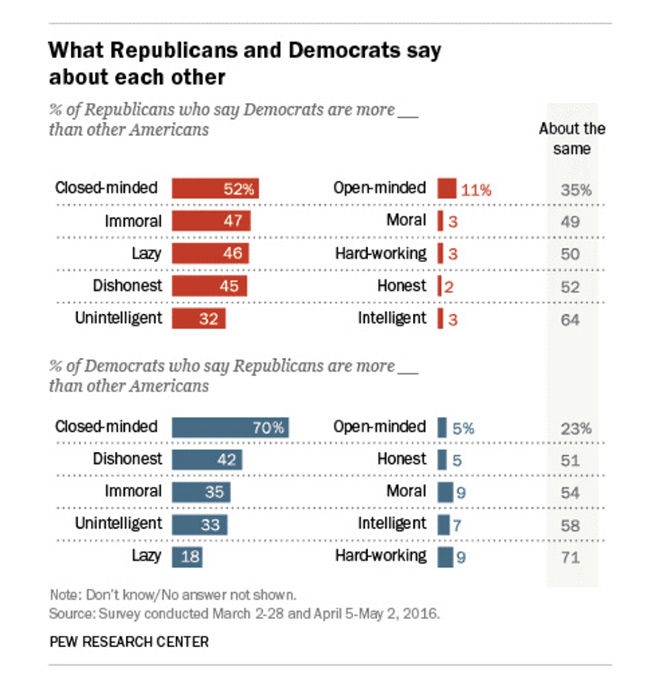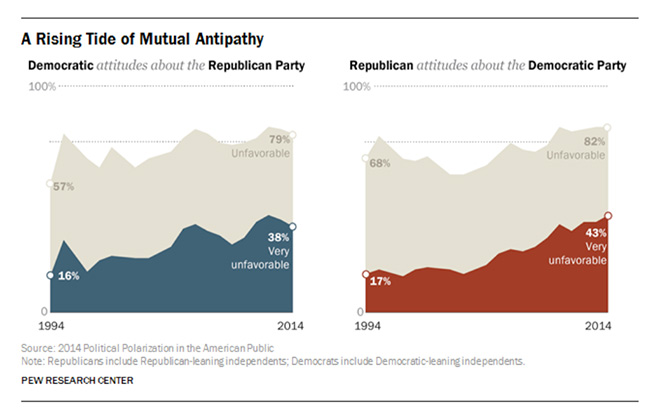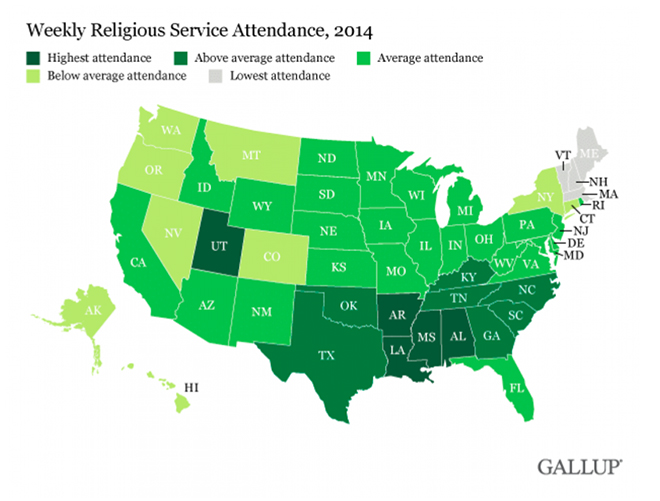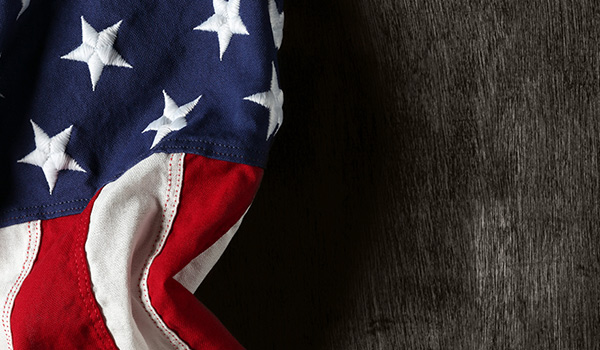At an increasing rate, Americans separate themselves into culturally and ideologically homogeneous enclaves.
Last week there were two telling incidents — one small, the other more consequential — that spoke volumes about the state of our national life. Let’s start small. Over in Seattle, in the midst of a debate over juvenile justice, a city-council member invoked his “Republican friends” as a symbol of the broad-based agreement that incarceration policies need to change. One of his colleagues, Kshama Sawant, snapped back with the proud declaration that she didn’t have any Republican friends. The crowd cheered.
Sure, it’s but one small incident, but consider something bigger. The state of California is in the process of taking a series of political steps that are not only cementing its status as a progressive enclave, it’s stumbling toward its own foreign policy. After Donald Trump withdrew America from the Paris climate agreement, California governor Jerry Brown rushed to fill the void. California is touting its collaborations with China to combat global warming. Here’s Brown, in reporting by the Sacramento Bee:
“It is a little bold to talk about the China–California partnership as though we were a separate nation, but we are a separate nation,” Brown said of the state, with nearly 40 million residents and the world’s sixth-largest economy. “We’re a state of mind. I include Silicon Valley, I include the environmental activism, the biotech industry, agriculture. This is a place of great investment in innovation.”
Indeed, California has such a different view of the relationship between citizen and state, it’s virtually seceding from the Constitution, overriding the First Amendment time and again for the sake of “social justice.” And now its legislature is even taking the first steps to implement a $400 billion single-payer health plan — a plan so expensive and radical that even Governor Brown is skeptical. The trends are clear. In the age of Trump, California is determined to go its own way.
None of this is surprising. Our national political polarization is by now so well established that the only real debate is over the nature of our cultural, political, and religious conflict. Are we in the midst of a more or less conventional culture war? Are we, as Dennis Prager and others argue, fighting a kind of “cold” civil war? Or are we facing something else entirely?
I’d argue that we face “something else,” and that something else is more akin to the beginning stages of a national divorce than it is to a civil war. This contention rests fundamentally in two trends, one political and the other far beyond politics. The combination of negative polarization and a phenomenon that economist Tyler Cowen calls “matching” is leading to a national separation so profound that Americans may not have the desire to fight to stay together. Unless trends are reversed, red and blue may ultimately bid each other adieu.
First, let’s deal with negative polarization. I’ve written about this before, but it’s worth repeating. Americans tend to belong to their political “tribe” not so much because they love its ideas but rather because they despise their opponents. The Pew Research Center has been documenting this trend for some time, and few of their (many) charts document the mutual hatred better than this one:

That’s right, Republicans and Democrats have basically the same view of each other — the only real difference is that Republicans view Democrats as more immoral, while Democrats view Republicans as more dishonest. And lest you think this is the way things have always been, look at the trend lines. Partisan Americans like each other less and less:

These trends would be troubling enough, but combine them with “matching” and you get a nation whose citizens increasingly lives separate lives — living in separate locations, enjoying separate media, and holding separate religious beliefs.
As Cowen relates in his important book, The Complacent Class, Americans now have an extraordinary ability not just to meet, interact, and maintain relationships with people of our own social and political class but also to form extraordinarily precise and insulated subcultures. The Internet brings all of human knowledge to our smartphones, but rather than using it as a tool for outreach and understanding, we’re using it to find and live with people just like us. In other words, we’re sorting.
Let’s go back to politics. Consider the growth of the “landslide county,” a county that one party or the other wins by at least 20 points. Here’s the New York Times, in a report shortly after the 2016 election: “The proportion of voters living in counties that were won in a landslide for the Democratic or Republican presidential candidate has steadily increased over the last seven elections and now makes up a whopping 60 percent of the electorate.”
This isn’t new. Here’s the Times with more:
In 1992, 38 percent of voters lived in one of these landslide counties, defined here as being won by 20 percentage points or more. This shift reflects the growing tendency of like-minded people to live near one another, according to Bill Bishop, a co-author of The Big Sort, a 2008 book that identified this phenomenon.
Mr. Bishop said Americans have been self-segregating by lifestyle, though not necessarily politics, for several decades, but lifestyle has grown to reflect politics. “We’re sorting by the way we live, think and — it turns out — every four years or every two years, how we vote.”
Bishop is exactly right: You can overlay the electoral map with any number of additional maps, including church-attendance maps and even maps of television ratings, and you’ll see clear political and cultural divides. Consider the church -attendance map below:

Each of the lowest-attendance states is blue. Each of the highest- and above-average-attendance states is solidly red. Most of the below-average-attendance states are blue. Just as striking (and important in their own way) are maps showing different television habits. It’s one thing to note that the decline in network dominance and a greater multiplicity of channels has increased choice. It’s another thing entirely to see how that choice plays out geographically.
Late last year, the New York Times published a series of ratings maps that showed exactly how a show can be popular without penetrating huge sections of the country. Take one of my favorite shows, Game of Thrones. Its appeal is heavily clustered in deep-blue coastal cities, something that’s completely unsurprising to this rural Tennessee resident. I have a hard time finding anyone who watches the show, much less someone who cares enough to do a deep dive into Westerosi lore. If you watch Game of Thrones, you’re also generally watching The Daily Show and Modern Family. Do you reject George R. R. Martin’s epic series? Then Duck Dynasty is the most likely show for you.
Put all these trends together and you can discern the reason for the “politicization of everything.” It’s easy: It’s often the path of least resistance, and it gives people a sense of larger purpose. When you live, work, and speak with people of like mind, it’s virtually inevitable that common expressions of shared views will leak into sports, corporate policy, and even debates about superhero movies. Americans have choices, and millions have chosen ideologically closed enclaves. Why wouldn’t they continue to extend that choice beyond the realms of politics and religion?
A civil war results when the desire for unification and domination overrides the desire for separation and self-determination. The American civil war is a classic example. There were grounds for separation — North and South were culturally different on a scale that dwarfs modern divides between red and blue — but the North did not consent. It sought to first unify and then transform the southern states. By contrast, had Scotland voted to leave the United Kingdom, would England have mobilized in response? No, the U.K. came close to its own national divorce, the dissolution of a union generations older than the American republic.
Here is the core American question. As we continue our own “big sort,” will the desire to separate trump the desire to dominate? Or can we instead choose to tolerate? We’re still quite far from the kind of near-miss that Britain just experienced, and we’re even farther removed from the vicious strife of a true civil war, but the trends are pointing toward continued matching of like with like — and along with that, increasing hostility against communities not like our own. In my Memorial Day column, I asked what I believe to be the key question: “Is there a single significant cultural, political, social, or religious trend that is pulling Americans together more than it is pushing us apart?”
I don’t believe a civil-war mentality will save America. There are simply too many differences and too many profound disagreements for one side or the other to exercise true political dominance. Red won’t beat blue in the same way that blue beat gray. Adopt the civil-war mentality and you’ll only hasten a potential divorce. No, absent a presently unforeseen unifying ideology, event, or person, the idea that will save America is one of the oldest ideas of the Republic: federalism.
So long as we protect the “privileges and immunities” of American citizenship, including all of the liberties enumerated in the Bill of Rights, let California be California and Texas be Texas. De-escalate national politics. Ideas that work in Massachusetts shouldn’t be crammed down the throats of culturally different Tennesseans. Indeed, as our sorting continues, our ability to persuade diminishes. (After all, how can we understand communities we don’t encounter?)
If we seek to preserve our union, we’re left with a choice — try to dominate or learn to tolerate? The effort to dominate is futile, and it will leave us with a permanently embittered population that grows increasingly punitive with each transition of presidential power. There is hope, however, in the quest to tolerate. Our Constitution is built to allow our citizens to govern themselves while protecting individual liberty and providing for the common defense. It’s built to withstand profound differences without asking citizens or states to surrender their strongest convictions. We can either rediscover this federalism, or we may ultimately take a third path — we may choose to separate.
— David French is a senior writer for National Review, a senior fellow at the National Review Institute, and an attorney.
Source: We’re Not in a Civil War, but We Are Drifting Toward Divorce, by David French, National Review
 Listen Online
Listen Online Watch Online
Watch Online Find a Station in Your Area
Find a Station in Your Area









 Listen Now
Listen Now Watch Online
Watch Online
